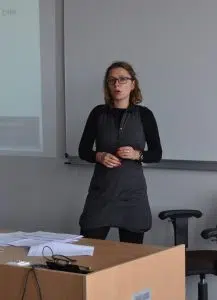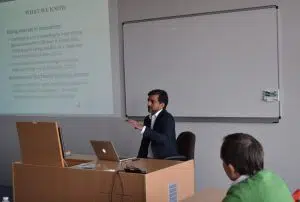Angers, 7th of November 2018 – Researchers, experts and students came together for a research seminar at the ESSCA campus in Angers. The objective was to discuss jointly on the one hand how cooperatives in France reacted to the financial crisis and on the other what are major barriers for innovation within family owned companies.
Every year the research seminar of the EU*Asia Institute in the fall semester is dedicated to the “Economie sociale et solidarie”, and for this occasion, Dr Anne Musson (ESSCA) presented her upcoming paper on French craftsmen cooperatives and the impact of the financial crisis.
Craftsmen cooperatives and the financial crisis
According to Dr Musson, cooperatives are of special interest, because their economic performance highly influences the prosperity especially of rural areas. Her recent paper, in co-authorship with Dr Damien Rousselière (AGROCAMPUS-OUEST), is the last of a three-part series and focuses on capital restraints for cooperatives following the financial crisis 2007-2009.
The objective of their latest paper was to understand the capital constraint and credit rationing faced by French craftsmen cooperatives during the crisis period. Especially the question of “How is the cooperatives capital constraint affected by the crisis?” was of interest for the two authors. Their main results revealed that crisis has negative impact on cooperative financial constraints, especially significant for small and medium cash flow cooperatives.
Dr Musson concluded her presentation with the statement, that craftsmen cooperatives appear resilient regarding other components of social economy, but the presence of capital constraint questions the financing issue during the period of economic downturn
Innovation in family businesses and path dependency
Dr Naveed Akhter (Jönköping University and affiliate researcher at the ESSCA EU*Asia Institute) investigated family business and asked the question of what are the barriers that keep these types of companies away from innovating. Family business are of extreme importance for economies, for example in Sweden 70% of business are family owned and numbers for India is even higher. Hence, it is crucial to find out how these companies can become more innovative.
During his presentation Dr. Akhter discussed the results of four case studies from Spain and Uruguay explained that tradition (path dependency) is responsible for whether family companies are innovative or not. If the founder of a family business was innovative, the probability that the company and the family carry on this attitude is higher. Hence, the past behaviour influences the present and the future for family business innovation.
References:
Anne Musson (ESSCA) & Damien Rousselière (Agrocampus Ouest): “Identifying the impact of crisis on cooperative capital constraints – The case of French craftsman cooperatives”
Naveed Akhter (Jönköping University) et al.: “Whether path dependency limits innovation – Innovation barriers and path dependence in family business”
[cite]






